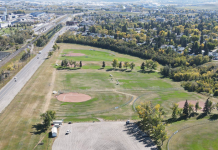Canadian Design and Construction Report
Two University of British Columbia faculty members have been awarded $1-million Wall Fellowships to advance research that could reshape how communities adapt to climate change and strengthen the resilience of buildings across B.C.
Dr. Melissa McHale, a professor in UBC Vancouver’s faculty of forestry, is leading a project to help communities adapt to hotter, drier and more fire-prone conditions. Her team will work with the City of Kelowna and Indigenous partners to establish Canada’s first long-term social-ecological research site. The goal is to integrate green infrastructure—such as shade trees, vegetation and water-conserving landscapes—into neighbourhoods to reduce wildfire risk, mitigate heat and improve livability.
At UBC Okanagan, structural engineer Dr. Lisa Tobber is using her fellowship to explore how midrise housing can be built to better withstand earthquakes and climate pressures. Her research will focus on the potential of precast concrete construction, which could provide safer, more durable and sustainable options beyond the wood-frame buildings typically used in the province.
Tobber’s team is developing experimental testing at UBC’s new Multi-Axis Subassembly Testing system, the first of its kind in Western Canada, to evaluate how precast systems perform during seismic events. The findings could influence future updates to Canada’s building code, particularly for housing projects in earthquake-prone regions.
“Precast concrete offers advantages in durability, fire resistance and speed of construction, but we need data on how it behaves in seismically active areas like B.C.,” Tobber said. “Our research will help determine how these systems can support affordable, climate-resilient housing.”
Both projects emphasize collaboration with Indigenous knowledge holders to create culturally appropriate, locally driven solutions.
The Wall Fellowships, the university’s highest-value internal research award, are funded through a more than $100-million endowment from Vancouver philanthropist Dr. Peter Wall. UBC describes the program as one of the largest internal university research awards in North America, representing an annual investment of about $4 million.
For the construction sector, the research could shape how B.C. communities design housing and infrastructure in the decades ahead—helping cities adapt to wildfire threats, extreme heat and earthquakes while advancing sustainable building methods.





